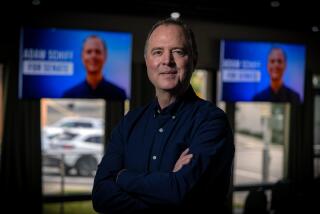‘The only mark I ever wanted was the Senate seat, and Hayakawa nosed me out there.’
- Share via
One way to look at it is that Robert H. Finch took some unlucky turns in his political life. He left the California lieutenant governorship, with its promise of a considerable future in California politics, to become secretary of health, education and welfare in the Administration of his old friend and mentor, Richard M. Nixon.
Then he left HEW to become an unhappy counselor in a Watergate White House whose staff was dominated by H. R. Haldeman and John Ehrlichman. Later, he ran for U.S. senator from California but was defeated in the 1976 Republican primary by S. I. Hayakawa.
So, down went the promise of a great political career.
But Finch, 62 and comfortably practicing law in Pasadena, serving as chairman of the Board of Trustees of Occidental College, as a member of the Nixon Presidential Archives Foundation and on various other boards, remarks now, “I’m at peace with myself.
“I had to work through a lot of remorse and recriminations” after his Washington experience, he said recently. “But I’m content with my mark. The only mark I ever wanted was the Senate seat, and Hayakawa nosed me out there (by a margin of about 4 to 3). I can enjoy it now vicariously with my relationship with (Sen.) Pete (Wilson).”
After he came home from Washington, Finch, who had no personal involvement in the Watergate scandal, remarked in a 1974 interview: “I couldn’t run for dogcatcher without it turning into a referendum on Watergate. . . . But at least I don’t have any trouble sleeping at night.”
Although he was somewhat critical of Nixon at the time, Finch says now that he has reestablished his friendship with the former President. “We talk frequently,” he remarked. “He’s been cordial.”
Last November, Finch was among a number of former Nixon aides who joined a four-day Nixon retrospective conference at Hofstra University. “Some of us met for the first time since Watergate,” he recalled. “We circled wagons and came together in collegiality on the second day, and the critics came around on the third.”
Finch was most active recently in a search for a new president of Occidental College, his alma mater.
He also maintains interest in the health issues he dealt with in the federal government, serving on the governing board of the Hospital Council of Southern California and on the board of the Huntington Memorial Hospital and participating in many conferences. He is a strong advocate of more funds for the study of viral diseases, AIDS and others.
In this connection, Finch for 12 years has been on the board of directors of a sometimes-controversial Orange County firm, ICN Pharmaceuticals Inc., developer of the anti-viral drug Virazole, also known as ribavirin, a proposed AIDS treatment.
Although the U.S. Food and Drug Administration rejected a request for wider tests of the drug on grounds its benefits were not established and the firm has been investigated by the U.S. Securities and Exchange Commission for alleged stock manipulations, Finch was not directly involved in the issues or accusations.
Almost three years ago, Finch suffered a heart attack and underwent a triple-bypass operation.
He is writing a book, terming it “my own commentary on political life, dealing with a lot of people I’ve known in politics. . . . It’s not a kiss-and-tell book.”
More to Read
Get the L.A. Times Politics newsletter
Deeply reported insights into legislation, politics and policy from Sacramento, Washington and beyond. In your inbox twice per week.
You may occasionally receive promotional content from the Los Angeles Times.










